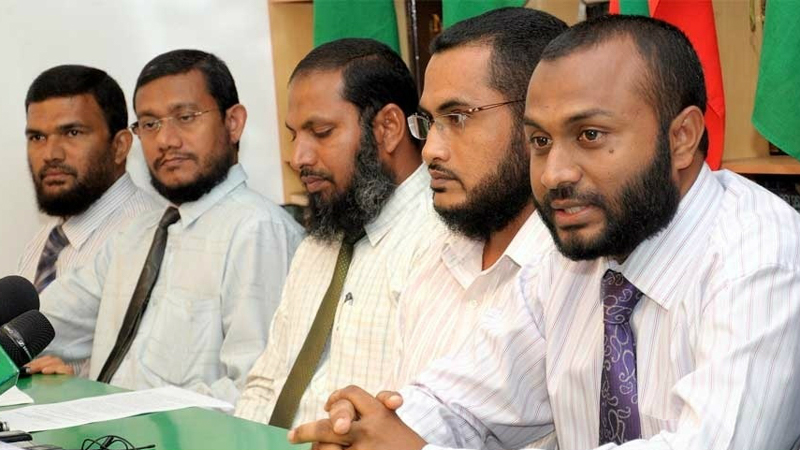Minister of Islamic Affairs Sheikh Mohamed Shaheem Ali Saeed has stated that, while the ministry is not aware of Maldivians taking part in Syria’s civil war, he does not believe it is right for locals to join foreign conflicts.
“This ministry is not aware of any Maldivians fighting in the Syrian war, nor is it a matter that concerns us. However, I personally do not believe it is right for any Maldivian youth to join another country’s war in the name of Islam,” he said.
The Islamic leader’s comments follow this week’s reports that two Maldivians had died while fighting forces loyal to Bashar Al Assad in Syria.
One government-aligned MP as well as a former senior police officer have today branded the authorities’ response insufficient and “irresponsible”.
“It does not do to just say that they are unaware of the problem,” said Jumhooree Party (JP) MP Ahmed Sameer.
While Vice President of the Fiqh Academy Sheikh Iyaz Abdul Latheef told Minivan News that the academy has no official view on the matter of jihad, Iyaz himself has blogged about the matter in his personal capacity.
Writing on ‘MV Islam Q&A’, Iyaz said it was unacceptable ‘jihad’ to fight in a war without seeking prior permission from the leader of the nation and from one’s parents. He also said that another arising from such ‘jihad’ is the unforgivable error of killing another muslim.
“Nothing the government can do”
President Abdulla Yameen has meanwhile claimed that the government is unaware of Maldivians fighting in the Syrian civil war. If they were, he added, then it is not being done with the government’s consent.
“We will not stay on the borderline after sending any Maldivians to war. So it is an extremely sorrowful incident that some from a family of Maldivians travelled to Syria, got involved in a dangerous encounter, and was killed in the process,” he told press upon his return from India yesterday (May 27).
Yameen said that the government had always urged Maldivians to maintain discipline when living abroad, adding that the responsibility for any crime willfully committed by an individual must be borne by the individual himself.
“If any Maldivian – regardless of where they are, or for what reason, even if not for war – notifies us that they are unable to come back to the Maldives, the government will offer any possible financial assistance to them. However, there is no way we can bring back anyone forcefully against their will,” said the president.
Police confirmed today that they are currently investigating the reports of the first Maldivian – said to have died in a suicide attack -while information was being gathered regarding the second individual.
An official said that, while mainstream media has reported an additional 20 Maldivians as having travelled to Syria, police had not received official information about the matter.
Maldives National Defence Force Spokesperson Major Hussain Ali confirmed that they too are investigating the matter, while Minister of Defence and National Security Mohamed Nazim was unable to comment on the matter at the time of press.
“Irresponsible government response”
A former senior police officer – speaking on condition of anonymity – described the government’s response as “highly irresponsible”, calling for immediate preventive measures.
“It has previously been alleged that there are terror cells here, and that the Maldives is also somehow involved in financing terrorism activities,” he said.
“In fact, the government must have been aware of this way before it was discussed in mainstream media. In light of these events, it is a likely danger – and a far more serious threat – that such actions may start operating here on our own land.”
Preventive measures must be taken now, and counter policies drafted, said the former officer, who went on to suggest that an excessive focus on domestic politics would be taken advantage of by extremists.
JP MP Sameer has also lent his voice to the debate today, stating that the government must have clearer policies on how to deal with such matters, and that he has heard of the government intervening to stop such actions in the past.
“Today, we have an Islamic Ministry and a Fiqh Academy – both institutions are state authorities on religion. If this act of joining the Syrian war is against Islamic norms and local policies as defined by these institutions, then I believe the government must take action against it,” he said.
“If, however, what they are doing is not against Islam or local policies, then the government should by all means facilitate them. What I am saying is that the government’s stand on the matter is unclear,” Sameer stated.
The opposition Maldivian Democratic Party previously released a statement on May 16 alleging that there was a prevalence of extremist ideologies within the Maldivian security forces.
Likes (1)Dislikes
(1)Dislikes (0)
(0) 